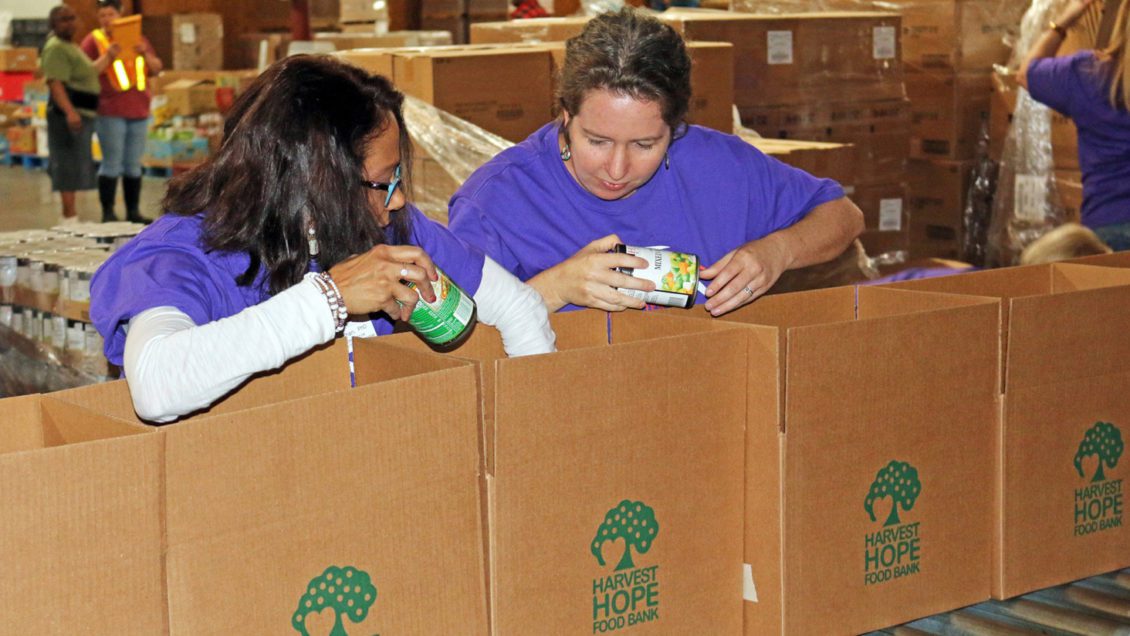[vid origin=”youtube” vid_id=”I1D2WhvMBhE” size=”medium” align=”right”]
COLUMBIA — One message that has been emphasized to the inaugural class of the Clemson University Extension Emerging Leadership Initiative is that leadership isn’t only about giving orders; it’s also about giving back.
For Lee Van Vlake, a Clemson Extension area livestock and forages agent who serves Florence and the Pee Dee region of South Carolina, developing that mentality has been among the program’s primary benefits.
“I got into this program because I wanted to continue to build on my foundation to be a good leader and practice that servant attitude,” Van Vlake said. “And I think that’s one big thing I’ve taken away from this class: To be a good leader, you need to serve others.”
The 19 members of the Extension Emerging Leadership Initiative program got the chance to give back in the Columbia community recently at Harvest Hope Food Bank. The food bank began in 1981 as the result of a shared vision of business leaders and the faith community who set out to provide for the hungry in Columbia. It has since increased its mission to feed the hungry across 20 counties of South Carolina, distributing more than 22.9 million meals last year and feeding approximately 40,425 people a week.

“Today we’re going to be boxing up food for some low-income folks, and I’m looking forward to that,” Van Vlake said. “Again, it goes back to being a servant.”
The Extension Emerging Leadership Initiative aims to groom the next generation of Clemson Cooperative Extension leaders. It was was modeled after the President’s Leadership Institute, a nine-month leadership development program started by Clemson University President James P. Clements.
Its objectives are to provide opportunities for personal growth and career development, enhance leaders’ roles at a higher level of excellence, bolster cohesion and team-building among leaders, promote and practice interpersonal skills and provide tools and skills to enhance leadership.
The program selects up to 20 professionals at the county or state level with a minimum of three years of experience with Extension. They must have the highest ethical standards and have demonstrated potential as future leaders.
For Anderson County 4-H youth development agent Jessica Simpson, the service project was not just an opportunity to give back through volunteering on a one-time basis, it also provided ideas for other service projects that she could take back to her home county.

“I know these individuals have had some misfortune and are in a really tough situation,” she said. “We see that in Anderson all the time. Our office is actually in the same building as a food pantry, and so we see a lot of the same clientele coming who are just trying to feed their families. These folks are in the same boat.”
As a 4-H county agent, Simpson said what she hoped to use the experience to teach the Anderson County youth she interacts with on a daily basis about the importance of serving their communities.
“I’m really looking forward to being able to give back and to learn some things from a large-scale food bank that we can possibly implement as service projects for local 4-H’ers,” she said. “The 4-H program is important to the people of South Carolina because those 4-H’ers are our future. We met with legislators for 4-H Legislative Day and to all of the 4-H’ers the big message was, ‘We’re getting older and you guys have to fill our shoes.’ So if we don’t lead today’s generation to make good, educated, informed decisions, we could be in a mess in the future. So I think we’re developing today’s leaders now and tomorrow’s leaders now.”
As the inaugural Extension Emerging Leadership Initiative class prepares for its graduation on April 18 in Columbia, the members heard from Extension Director Tom Dobbins on “Motivational Moments” and learned about “Servant Leadership and Gratitude” before traveling to the Harvest Hope Food Bank to participate in the service project.

“The food drive is meaningful to me because it helps others in need and you’re giving back and helping people who are down right now and cannot help themselves,” Sumter County senior 4-H youth development agent Terri Sumpter said. “So being able to feed and provide for others, it’s just a good thing to do.”
“I think volunteering is a big part of being a leader,” said Zack Snipes, Extension county agent in Charleston. “It gets you down to your roots and lets you know that you’re serving a bigger purpose, a bigger goal. And so today, it’s really a time to reflect and think about others and that some people aren’t as fortunate as we are and that we should be grateful and help out wherever we can.”
Get in touch and we will connect you with the author or another expert.
Or email us at news@clemson.edu

